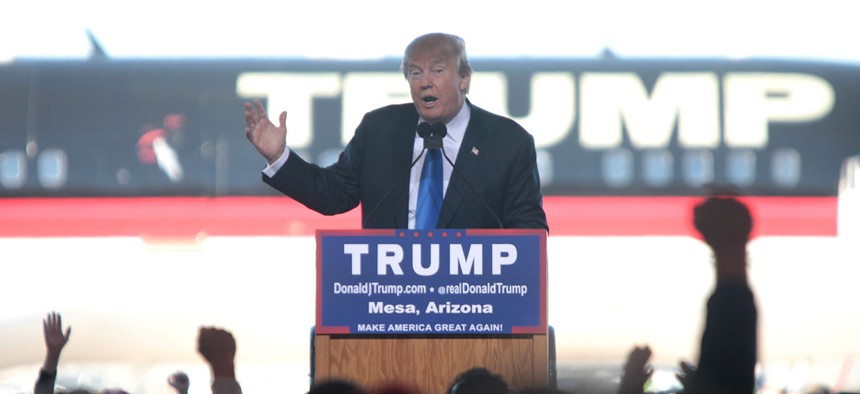
Flickr user Gage Skidmore
Donald Trump Won't Release His Tax Returns Before the Election
Presidential candidates have released IRS forms for years, but the GOP candidate wants to break that pattern.
“This is the ultimate reality show—it’s the presidency of the United States,” Paul Manafort, a top adviser to Donald Trump, said on MSNBC Tuesday. Manafort’s comment was intended as both a defensive measure—a reply to those who mock Trump as a lightweight who thinks he’s still on The Apprentice—and a rebuke to President Obama, one of those who voiced the critique, sniping last week, “We are in serious times; this is a really serious job. This is not entertainment. This is not a reality show.”
But Manafort’s statement is also a useful key to explaining how Trump is approaching the general election. One of the rules of reality shows—right after not being there to make friends—is to break the rules. In an interview with the Associated Press released Wednesday morning, Trump said he will not release his tax returns before the general election in November. Here’s the AP report:
"There's nothing to learn from them," Trump told The Associated Press in an interview Tuesday. He also has said he doesn't believe voters are interested.
This being Trump, it’s unwise to wager much on him sticking to that if the heat gets too intense—like every other politician, Trump launches trial balloons, though his are often less subtle. But if he didn’t release the documents, it would represent a serious change in norms about what Americans can expect to know about their leader.
The habit of candidates universally releasing tax returns runs back to the 1970s. Even before then, there’d been some releases. George Romney famously released 12 years of returns ahead of the 1968 election. During the 2012 election, George’s son Mitt dragged his feet on releasing returns, earning some unflattering comparisons. At the time, Politifact investigated and found that since 1972, only seven presidential nominees had refused to release their returns: Democrat Jerry Brown (1992); Republicans Pat Buchanan and Dick Lugar (1996), Mike Huckabee, Rudy Giuliani, and Romney (2008), and Green Party candidate Ralph Nader (2000).
One thing sticks out about those candidates: None of them won a major-party nomination, or for that matter really came especially close. Trump, as the presumptive nominee of the Republican Party, is a different situation.
But Trump is a different situation for other reasons, too. He’s far wealthier than any other candidate to run for president, and he has a long history of questionable finances, and faces other allegations. His companies have declared bankruptcy four times. He’s been fined by the Federal Trade Commission for improper behavior. He incorrectly received a tax break for people making less than $500,000 per year. All of this means that people might have legitimate questions about what Trump is doing with his supposed vast sums: what he does with it, whether those things are legal, and further whether the techniques he likely uses to reduce his tax obligations (like many wealthy people) are appropriate, even when they are legal. Given Trump’s repeated attacks on companies that move their profits offshore, or hedge-fund managers who use the carried-interest loopholes, voters have a right to know whether he practices what he preaches.
It is true that candidates are all required to file a personal financial disclosure as part of post-Watergate reforms from the 1970s, but tax experts say returns offer a more complete view. Trump released a disclosure in 2015, claiming that he was worth $10 billion. But many finance experts greeted that estimate with feelings ranging from skepticism to derision. The disclosure form allows for ranges of values, so that Trump could simply say certain holdings were worth more than $50 million—and then claim the top-line value. The Wall Street Journal offered a more sober estimate of “at least $1.5 billion.”
The journalist Tim O’Brien was especially savage in mocking Trump’s rather inflated claims of value for his brand. If it seems a little personal for O’Brien, that’s understandable—and the backstory explains why it’s wise to be skeptical of Trump’s claims and push for more disclosure. In a 2005 book, O’Brien sought to determine just what Trump was really worth. He concluded that the Donald was really only worth $150 to $250 million. Trump, outraged, sued O’Brien for $5 billion for libel. (Perhaps he doth protest too much!) It didn’t work: The suit was thrown out. That doesn’t prove that O’Brien was right—it only proves that there weren’t grounds for a libel case—but the proceedings offered more reasons to doubt the face value of Trump’s claims, as O’Brien writes.
Moreover, Trump appears to already be lying about his taxes. He claims that he can’t release them now because he is being audited. Yet that claim is false: The IRS says there’s no reason a citizen can’t release returns that are under audit. If Trump stands behind the returns he signed, why not just put them out there?
As Matt Gertz says, Trump’s statement that he won’t is a provocation to the media—in saying that citizens don’t care, he’s laying down a challenge to the press to make them care, and force him to release the returns. In the past, at least, that has worked. Romney ultimately opted to release his returns, despite misgivings, after extensive pressure from the media and other politicians. Stuart Stevens, a former top Romney aide, suggested that the Commission on Presidential Debates could make release a prerequisite for participation.
Whatever the mechanism, voters deserve a chance to assess Trump’s returns before they make their choice in November. The entertainer may be running a different sort of campaign, inspired by reality TV, but that doesn’t mean give him any leeway to cut them off from the normal information about a candidate’s private life. Besides, isn’t voyeurism the real allure of reality shows anyway?






